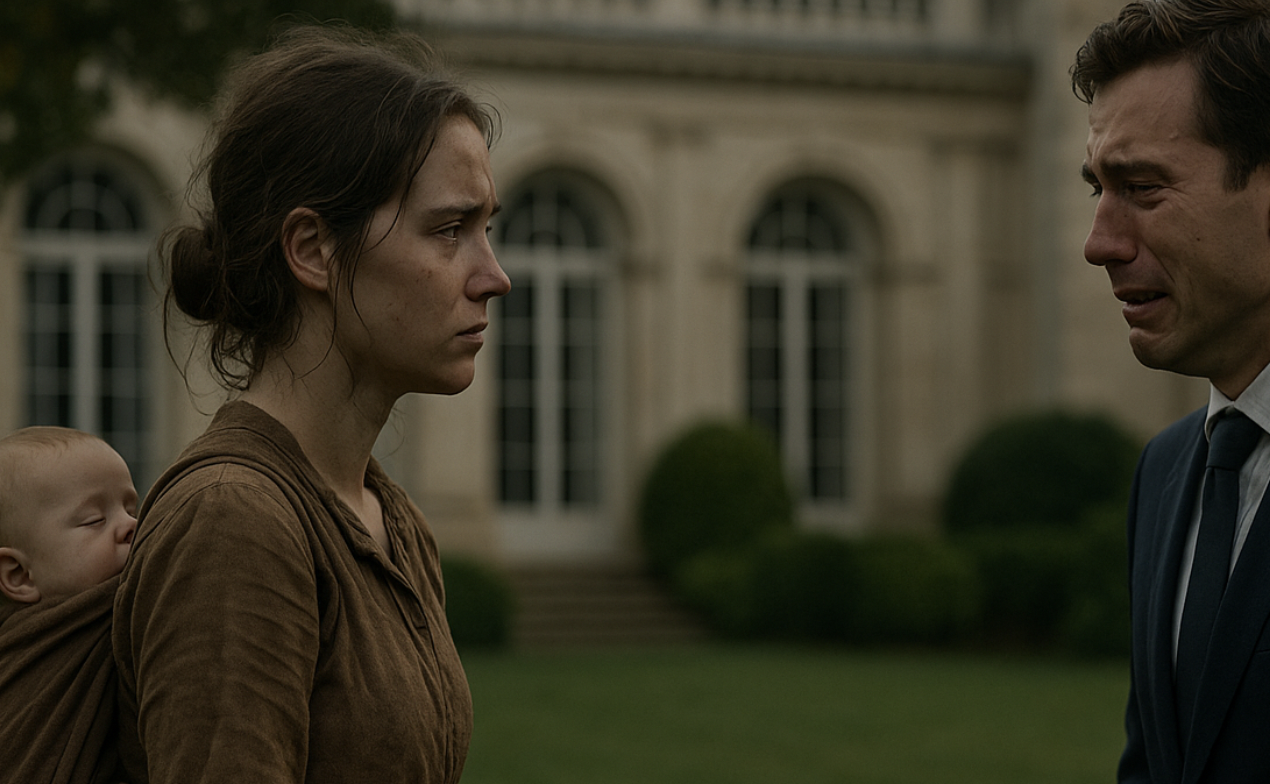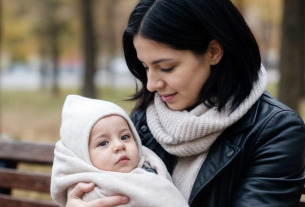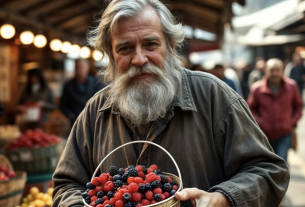The iron gates of the Whitmore estate loomed like ironclad sentinels against a bruised evening sky, their black latticework swallowing the last gold threads of dusk. Most people kept their distance from those gates; they had a way of making hope feel small. But on this night, a young woman stood there with dirt streaking her cheeks and a baby bound to her back with a frayed scarf. She pressed a trembling finger to the intercom.
“Sir… do you need a maid? I can do anything,” she called as the gates slid open to release a departing car. Her voice splintered on the final word. “Please—my sister is hungry.”
The sedan rolled past and the scent of expensive leather and gasoline drifted through the bars. Inside the gravelled drive, under a canopy of plane trees trimmed into perfect obedience, Charles Whitmore was stepping out of the back seat. He was used to the choreography of the wealthy: the way people approached with smooth words and empty hands. He had learned to harden his heart against sudden tragedies told for the price of his signature.
But this girl made him stop. Thin. Dress bleached by too many washings. Eyes like struck flint.
And then he saw it—the crescent birthmark, pale and sharp against the soft skin at the side of her neck.
The sight punched the air from his lungs. Memory flooded him, rain-slick and merciless: Margaret in a doorway years ago, hair wild, clutching a bundled newborn; Margaret on that last storm-bitten night, face set in a private grief he could not breach; the rumors that followed like wolves—she’d run, she was ruined, she’d borne a child and vanished. He had searched in cities that smelled of sea and coal and in towns that closed their shutters at sundown. Nothing. Just that shape burned into his mind—the moon-slice mark he’d kissed on a sleeping infant’s skin.
“Where did you get that?” he asked, harsher than he meant, pointing to her neck.
She flinched and covered it with her fingers. “This? I was born with it.”
His heart slammed once, twice. “Your name.”
“Elena,” she said, cautious now. “And this is Lily, my sister. Our parents are gone.” She swallowed, and the sound was small and human in the vastness. “I’ll take any job—cleaning, cooking, anything—just to keep her fed.”
He studied her as if the rest of the night had slowed on its axis. The curve of her mouth. The stubborn lift of her chin. The way she adjusted the baby’s weight without thinking, how she stood between the child and the wind. Margaret echoed everywhere.
He had long ago taught himself not to hope. Yet hope surged, ungovernable.
“Come inside,” he said, voice steadying on command.
Elena hesitated, glancing past him at the mansion—marble lions, tall windows burning with chandelier light, the world of people who never feared tomorrow. Fear warred with a flicker of something warmer. “Sir, I… I don’t want to cause trouble.”
“You’re not.” He was already signaling to the house staff. “Mrs. Keane, prepare a room.”
Elena stepped over the threshold with Lily clutched to her back. The foyer sighed around them—polished stone, a quiet fountain, the cool scent of lemon wax. Charles felt rather than knew that the shape of his life had just shifted. This wasn’t charity. This was blood. And stories owed.
He did not tell her that first night. Instead, he watched.
Days slipped into a careful rhythm. Elena moved like a ghost of steam and footsteps through rooms that could have swallowed her whole—buffing tables until the walnut gleamed like lakewater at noon, sweeping halls that stretched farther than any shelter she and Lily had known. When the baby cried, Elena’s body knew the dance without thinking: sway and hum, hand at the small back, cheek bent to dark hair.
At dinner, Charles asked questions with the cool courtesy of a man who’d forgotten how to beg for answers. Where had she lived? What did her mother teach her to cook? Did she sing to the baby at night? Elena parried with restrained truth—towns with names that tasted of dust, recipes learned from women who traded bread for stories, lullabies caught from an older girl in a church basement. Charles listened too closely, as if each word were a thread in a net he’d thrown decades ago.
On a mild afternoon, while the butler was out and the light slanted in cathedral windows, the telephone rang. Elena wiped her hands on her apron and lifted the receiver.
“Hello—Whitmore residence.”
Static hissed. Then a woman’s voice, thin and shaking: “Is this… Elena?”
“Yes,” Elena said slowly. “Who is this?”
The line crackled as if slicing through weather. “Tell Charles… Margaret is alive.”
The call snapped off. The house seemed to tilt under her feet. She stood there with the dial tone breathing in her ear, the name hovering like smoke in a chapel.
At dinner, over roasted pheasant and quiet silver, she repeated the message. Charles’s fork clattered; a bright starburst of steel against porcelain. Color dropped out of his face.
“What did she sound like?” he asked, too fast, as if he were falling and needed the answer to grow wings.
“Like someone who’d been crying,” Elena said. “She knew my name.”
He pushed back from the table and vanished into his study. Moments later, the hard shatter of glass ricocheted into the hall. No one went to him. Old houses learned how to hold their breath for their masters.
After that, his questions grew sharper, his presence closer—as though he were searching her features for a signature written in bone. On the third day, the sky bruised over and rain began its slow drum on the roof. He sent for her.
The library was a cathedral of leather and dust, spines gilded with old knowledge. He stood by the window with his hands gripping the back of a chair, as if bracing against a gale only he could feel.
“I owe you the truth,” he said at last. “The woman who called—Margaret—is my sister. And… she’s your mother.”
Elena felt the floor leap and drop. “No,” she said softly—pleading with the room more than with him. “My mother died in an accident when I was twelve.”
Charles shook his head, grief and apology caught together. “She ran from this life before you were old enough to remember it. She was pregnant—with you. I searched. She hid. And when there was no trace left to follow, I learned how to keep breathing without the answer.” He swallowed. “Until you.”
The words broke over her like a winter wave and left her gasping. If this was true, she was not an interloper who had slipped in through the service door. She belonged, by some fierce and crooked miracle.
“But I need to know,” she whispered. “I need to see.”
Fate, as if listening, barreled to meet them.
Three nights later, the storm returned with teeth. Wind rattled the laurels; rain stitched bright threads across the security lights. The intercom crackled at the gates. The butler murmured into it, then hurried. When the front doors opened, a woman stumbled into the foyer, rain-streaming and gaunt, eyes enormous in a too-thin face.
Elena stepped from the corridor—and saw the future rearrange itself. The woman’s mouth was her mouth. The scar at the brow. The shy, familiar tilt to the smile as if apologies lived there.
“Elena,” the stranger breathed, a prayer shaped around a name. “My baby.”
Elena’s knees gave and she was already moving, unfastening Lily, reaching. Arms closed around her in a clutch that shook with sobs she hadn’t known were waiting. She pressed her face into the cold-wet fabric and smelled rain and salt and something like home after a long storm.
The reunion arrived jagged, full of torn edges and truths forced through narrow spaces. Between cups of hot tea and towels and the fire’s coaxed warmth, the story unwound: an engagement that curdled into danger, fists hidden inside love words; the shame of returning to wealth with a bruised face; the terror that in this house of fine things her daughter would become a possession, bright and caged. Margaret ran. She moved when whispers found her. She worked until her hands were a map of service. She kept Elena safe in motion. When illness threaded its way into her bones, she searched for a way back to the brother she had both loved and feared to face.
Charles listened with eyes that had learned not to weep and failed that lesson now. He did not judge, because judgment is easy and love is not. When Margaret’s voice broke, he said only, “You’re safe now. Both of you.”
The house transformed around that sentence. Elena no longer wore the quiet uniform of staff. She walked the halls without apologizing for the sound of her steps. Lily’s toddling became the estate’s weather—her small laughter a barometer of peace. Margaret recovered by degrees, her presence turning rooms warm. Charles altered, almost imperceptibly at first—the man who had always translated love into contracts began to discover the undrafted dealings of family. He funded Elena’s education with the same brisk efficiency he brought to mergers, but the pride that flushed his face when she passed each course had nothing to do with capital.
Together, he and Margaret launched a foundation in the Whitmore name to lift single mothers who were navigating the same sharp roads Margaret had walked alone. They bought cribs. They built programs. They listened. The mansion became a place where the world’s pain could be invited in and asked to rest.
Years later, on a spring afternoon shimmering with new leaves, the foundation hosted its first graduation. In a rented hall smelling of lilies and hope, women in secondhand dresses stood tall, certificates trembling in their hands, children clapping in the front rows. Elena faced them at the podium, a sleek dress skimming the steadiness of her now, her hair pinned up, Lily—long-legged and laughing—leaning against Margaret’s knee in the front row. Charles sat beside them, the anchor he had learned how to be.
Elena rested her hands on the wood, found her breath, and began.
“Once,” she said, and the room hushed, “I stood outside iron gates and begged for work. I had a baby on my back and a kind of hunger I didn’t know how to name. A man opened a door. A woman found her way home. And I learned that sometimes the past is not a chain—it’s a key. Tonight, I stand here with my family to tell you that light can find you even through the darkest storm, if someone is willing to listen.”
When the applause rose—sudden and tidal—she saw Margaret’s eyes shining, pride cupped in the fragile bowl of her hands. Charles looked at Elena as if he could see the whole map of the years they’d stolen back.
That night, the house was gentle. Elena tucked Lily into a bed that once belonged to a girl who thought safety was a rumor. Margaret hummed a lullaby that had traveled miles in her chest, its notes thinner now but truer. Charles stood in the doorway, a silhouette rimmed in lamplight, his face unguarded.
For the first time in decades, the Whitmore family felt complete—not because they had mended every tear, but because they stood together, fingers crooked through the same net.
Elena lay down later and listened to the old house breathe. Beyond the windows, the iron gates gleamed under the moon like a herald instead of a barrier. She knew with a certainty that reached to her bones: she would never again have to beg to survive.
She had found her way back not only to a roof and a table, but to a name, a story, a home. And this time, the door would stay open.



